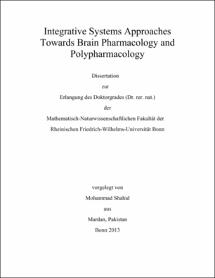Shahid, Mohammad: Integrative Systems Approaches Towards Brain Pharmacology and Polypharmacology. - Bonn, 2014. - Dissertation, Rheinische Friedrich-Wilhelms-Universität Bonn.
Online-Ausgabe in bonndoc: https://nbn-resolving.org/urn:nbn:de:hbz:5n-35429
Online-Ausgabe in bonndoc: https://nbn-resolving.org/urn:nbn:de:hbz:5n-35429
@phdthesis{handle:20.500.11811/6060,
urn: https://nbn-resolving.org/urn:nbn:de:hbz:5n-35429,
author = {{Mohammad Shahid}},
title = {Integrative Systems Approaches Towards Brain Pharmacology and Polypharmacology},
school = {Rheinische Friedrich-Wilhelms-Universität Bonn},
year = 2014,
month = may,
note = {Polypharmacology is considered as the future of drug discovery and emerges as the next paradigm of drug discovery. The traditional drug design is primarily based on a “one target-one drug” paradigm. In polypharmacology, drug molecules always interact with multiple targets, and therefore it imposes new challenges in developing and designing new and effective drugs that are less toxic by eliminating the unexpected drug-target interactions. Although still in its infancy, the use of polypharmacology ideas appears to already have a remarkable impact on modern drug development.
The current thesis is a detailed study on various pharmacology approaches at systems level to understand polypharmacology in complex brain and neurodegnerative disorders. The research work in this thesis focuses on the design and construction of a dedicated knowledge base for human brain pharmacology. This pharmacology knowledge base, referred to as the Human Brain Pharmacome (HBP) is a unique and comprehensive resource that aggregates data and knowledge around current drug treatments that are available for major brain and neurodegenerative disorders. The HBP knowledge base provides data at a single place for building models and supporting hypotheses. The HBP also incorporates new data obtained from similarity computations over drugs and proteins structures, which was analyzed from various aspects including network pharmacology and application of in-silico computational methods for the discovery of novel multi-target drug candidates.
Computational tools and machine learning models were developed to characterize protein targets for their polypharmacological profiles and to distinguish indications specific or target specific drugs from other drugs. Systems pharmacology approaches towards drug property predictions provided a highly enriched compound library that was virtually screened against an array of network pharmacology based derived protein targets by combined docking and molecular dynamics simulation workflows. The developed approaches in this work resulted in the identification of novel multi-target drug candidates that are backed up by existing experimental knowledge, and propose repositioning of existing drugs, that are undergoing further experimental validations.},
url = {https://hdl.handle.net/20.500.11811/6060}
}
urn: https://nbn-resolving.org/urn:nbn:de:hbz:5n-35429,
author = {{Mohammad Shahid}},
title = {Integrative Systems Approaches Towards Brain Pharmacology and Polypharmacology},
school = {Rheinische Friedrich-Wilhelms-Universität Bonn},
year = 2014,
month = may,
note = {Polypharmacology is considered as the future of drug discovery and emerges as the next paradigm of drug discovery. The traditional drug design is primarily based on a “one target-one drug” paradigm. In polypharmacology, drug molecules always interact with multiple targets, and therefore it imposes new challenges in developing and designing new and effective drugs that are less toxic by eliminating the unexpected drug-target interactions. Although still in its infancy, the use of polypharmacology ideas appears to already have a remarkable impact on modern drug development.
The current thesis is a detailed study on various pharmacology approaches at systems level to understand polypharmacology in complex brain and neurodegnerative disorders. The research work in this thesis focuses on the design and construction of a dedicated knowledge base for human brain pharmacology. This pharmacology knowledge base, referred to as the Human Brain Pharmacome (HBP) is a unique and comprehensive resource that aggregates data and knowledge around current drug treatments that are available for major brain and neurodegenerative disorders. The HBP knowledge base provides data at a single place for building models and supporting hypotheses. The HBP also incorporates new data obtained from similarity computations over drugs and proteins structures, which was analyzed from various aspects including network pharmacology and application of in-silico computational methods for the discovery of novel multi-target drug candidates.
Computational tools and machine learning models were developed to characterize protein targets for their polypharmacological profiles and to distinguish indications specific or target specific drugs from other drugs. Systems pharmacology approaches towards drug property predictions provided a highly enriched compound library that was virtually screened against an array of network pharmacology based derived protein targets by combined docking and molecular dynamics simulation workflows. The developed approaches in this work resulted in the identification of novel multi-target drug candidates that are backed up by existing experimental knowledge, and propose repositioning of existing drugs, that are undergoing further experimental validations.},
url = {https://hdl.handle.net/20.500.11811/6060}
}






